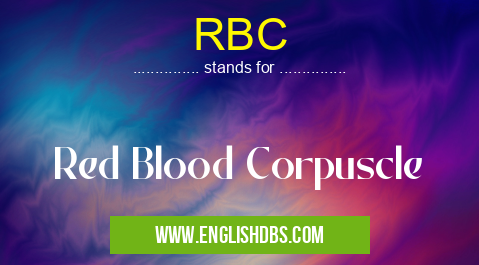What does RBC mean in UNCLASSIFIED
RBC stands for Red Blood Corpuscles, also known as erythrocytes. They are the most abundant type of blood cells and play a crucial role in the body's oxygen transport system. RBCs are responsible for carrying oxygen from the lungs to various tissues and organs.

RBC meaning in Unclassified in Miscellaneous
RBC mostly used in an acronym Unclassified in Category Miscellaneous that means Red Blood Corpuscle
Shorthand: RBC,
Full Form: Red Blood Corpuscle
For more information of "Red Blood Corpuscle", see the section below.
Characteristics of RBCs
- Shape: RBCs are typically biconcave, which means they have a flattened disc shape with a central depression. This unique shape allows them to flow easily through narrow blood vessels.
- Size: RBCs are approximately 7-8 micrometers in diameter and 2-3 micrometers thick.
- Hemoglobin: RBCs contain a protein called hemoglobin, which binds to oxygen molecules. Hemoglobin is responsible for the transport of oxygen throughout the body.
- Lifespan: RBCs have a lifespan of approximately 120 days. After this period, they are removed from the circulation and replaced by new RBCs.
Functions of RBCs
- Oxygen Transport: The primary function of RBCs is to transport oxygen from the lungs to the tissues and organs. They bind to oxygen molecules in the lungs and release them at the tissue level.
- Carbon Dioxide Transport: RBCs also play a role in the transport of carbon dioxide, a waste product of cellular metabolism. Carbon dioxide molecules dissolve in the blood plasma and are transported to the lungs for exhalation.
- pH Regulation: RBCs contain a compound called carbonic acid, which helps regulate the pH of the blood.
Importance of RBCs
- Oxygen Supply: RBCs ensure an adequate oxygen supply to all parts of the body, which is essential for cellular metabolism and energy production.
- Waste Removal: RBCs contribute to the removal of carbon dioxide, a waste product of metabolism.
- Homeostasis: RBCs play a role in maintaining the pH balance of the blood, which is crucial for various bodily processes.
Essential Questions and Answers on Red Blood Corpuscle in "MISCELLANEOUS»UNFILED"
What are Red Blood Corpuscles (RBCs)?
RBCs, also known as erythrocytes, are specialized cells that play a crucial role in the transportation of oxygen and carbon dioxide in the body. They are filled with a protein called hemoglobin, which binds to oxygen and carries it from the lungs to tissues and organs.
What is the normal RBC count?
The normal RBC count varies slightly depending on age and gender. However, the general range for adults is:
- Men: 4.5 to 6.3 million per microliter (µL)
- Women: 4.1 to 5.3 million per µL
What does a high RBC count mean?
A high RBC count, known as erythrocytosis, can indicate:
- Dehydration
- Smoking
- Polycythemia vera (a blood disorder where the bone marrow produces too many red blood cells)
- High altitude, where the air is thinner and the body produces more RBCs to compensate
What does a low RBC count mean?
A low RBC count, known as anemia, can be caused by:
- Blood loss
- Iron deficiency
- Vitamin B12 or folate deficiency
- Bone marrow disorders
- Chronic diseases such as cancer or kidney disease
What are the symptoms of anemia?
Symptoms of anemia may include:
- Fatigue
- Shortness of breath
- Pale skin
- Lightheadedness
- Cold hands and feet
How are RBC disorders diagnosed?
RBC disorders are typically diagnosed through a blood test called a complete blood count (CBC). The CBC measures the number, size, and shape of RBCs, as well as other blood components.
Can RBC disorders be treated?
The treatment of RBC disorders depends on the underlying cause. For example:
- Iron deficiency anemia is treated with iron supplements.
- Polycythemia vera may be managed with medication or bloodletting.
- Anemia caused by chronic diseases is treated by addressing the underlying condition.
Final Words: RBCs are vital components of the body's blood system, responsible for oxygen transport and other important functions. Understanding their characteristics, functions, and importance helps us appreciate the complexity and significance of the human body.
RBC also stands for: |
|
| All stands for RBC |
